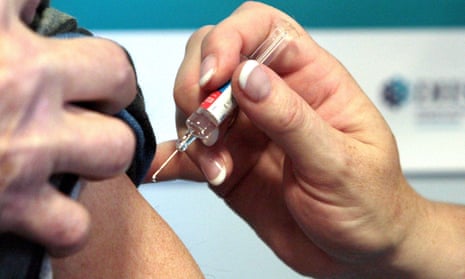More than half the states in America have seen a decline over the past decade in the take-up rates among kindergarten children of vaccines against diseases such as measles, mumps, hepatitis B and polio, as unfounded anti-vaccination theories have spread.
A new study by Health Testing Centers has found between 2009 and 2018 27 of the 50 US states experienced a drop in the percentage of vaccinated kindergarten-age children. In Georgia and Arkansas, the decline was more than 6%.
The measles, mumps and rubella vaccine (MMR), which is the focus of much activity by the so-called anti-vaxxer movement, is especially vulnerable. Alarmingly, the study finds that more than half of the states – 26 in total – have vaccination rates that have fallen below the target of 95% which experts state is needed to provide maximum protection against the diseases.
Three states – Colorado (88.7%), Kansas (89.1%) and Idaho (89.5%) – have rates that have fallen below the 90% that scientists say renders populations particularly vulnerable to a measles outbreak.
The study is based on data compiled by the federal Centers for Disease Control and Prevention (CDC). The authors analyzed CDC data covering the vaccination rates for kindergartners for the most common vaccines including MMR, polio, hepatitis B and varicella.
“For diseases with deadly potential, such as measles and polio, vaccination rates have fallen or remained below ideal thresholds,” the study concludes.
Geographic concentration of anti-vaccination sentiment is only one factor to be taken into account in gauging the efficacy of vaccines in fighting disease. The CDC has pointed out that lack of access to healthcare or to health insurance in low-income families is also important causes of children going unvaccinated.
The news comes at a time of renewed attention on the activities of anti-vaxxer campaigners who are vociferously opposed to the mandatory vaccination of children. Opponents of vaccines frequently peddle incorrect information, such as the debunked theory that MMR causes autism.
Earlier this month supporters of the discredited British former physician, Andrew Wakefield, released Vaxxed 2, a sequel to a documentary that has been used to spread anti-vaxxer propaganda across the US. Wakefield, who directed the original Vaxxed and appears in the follow-up, was debarred from practicing in 2010 after the study he published in the Lancet questioning the safety of MMR was found to have been conducted dishonestly.
Vaxxed 2 credits as its executive producer Robert F Kennedy Jr, the son of the assassinated Democratic presidential candidate who shared his name. Kennedy’s group Stop Mandatory Vaccinations was this week disclosed to be one of two organizations funding most of the misleading anti-vaxxer ads bought on Facebook.
The US has also been wrestling with localized outbreaks of measles in California, New York and other states. The importance of local concentrations of opposition to vaccinations is highlighted by the fact that New York state, which has suffered some of the worst measles outbreaks, overall has one of the highest rates of MMR vaccination at 97.2% of kindergartners.
Most of the measles cases in New York were confined to parts of New York city and Rockland county. The outbreaks caused more than 900 cases of the illness largely among children in ultra-orthodox Jewish communities where vaccination is widely opposed.
The Health Testing Centers study emphasizes that trends vary greatly from state to state. South Carolina and Iowa have both seen vaccination rates across the board increase from 2009 to 2018 by 8.5%.
Mississippi stands at the top of the league table for MMR, with 99.4% of its kindergartners vaccinated.
